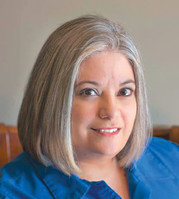By LAURA WEICK A former state senator is seeking to reclaim her District 39 seat from the incumbent during Sept. 8's Democratic primary: another race that will determine how progressive the state's Democratic Party will look in 2021. In 2016, Jeanine
This item is available in full to subscribers.
We have recently launched a new and improved website. To continue reading, you will need to either log into your subscriber account, or purchase a new subscription.
If you are a current print subscriber, you can set up a free website account by clicking here.
Otherwise, click here to view your options for subscribing.
Please log in to continue |
|


A former state senator is seeking to reclaim her District 39 seat from the incumbent during Sept. 8’s Democratic primary: another race that will determine how progressive the state’s Democratic Party will look in 2021.
In 2016, Jeanine Calkin, a life-long Rhode Islander who supported Bernie Sanders for president, defeated former Senate District 30 incumbent Sen. William Walaska in the 2016 Democratic primary. The progressive candidate ran unopposed in the following general election. Before getting involved in politics, Calkin worked in I.T. for many years, which she credits for helping her understand how large corporations’ dedication to profits impacts workers.
Two years later Mark McKenney challenged Calkin in the 2018 primary, where he defeated her and ran unopposed in the general election. McKenney grew up in the Buttonwoods neighborhood of Warwick and is a partner at the legal firm of McKenney, Clarkin and Estey.
Now, Calkin is trying to regain her seat. The primary’s winner will face independent candidate John Ritchie in the Nov. 3’s general election.
McKenney backed a ban on 3-D printed and ghost guns and increasing the minimum wage to $11.50. This year, he introduced bills that would phase out the taxation of pensions and prohibit privately run detention facilities in Rhode Island by 2028, but neither has made it to a senate vote yet. McKenney said he was not able to accomplish as much as he wished in 2020 due to the COVID-19 pandemic, and hopes that by being reelected he could introduce more legislation.
“There’s a lot more work to be done,” McKenney said. “I am somewhat frustrated by the fact that we are unable to legislate, to meet, because of the pandemic, and that has kept us from working on issues that are very important to us, things we want to see accomplished in the legislature. I had a boatload of things I was looking to do this year, but since we weren’t able to be there, those were put on hold. I’m not looking to stay in office for any great length of time, I want to see things get done for Warwick, in the state.”
Calkin’s legislative record includes cosponsoring a law that requires employers with over 18 employees to provide three paid sick days in 2018, four in 2019 and five from then on, and a law that limits access to firearms for people under certain domestic abuse restraining orders. Legislation that she co-sponsored that did not become law includes a net neutrality bill, which would require that all internet service provides not alter service or charge differently based on a user, website or content, and a bill that would abolish the “employment-at-will” state doctrine, which allows employers to terminate employees at any time for any reason, as well as employees to leave any time for any reason.
“I’m not a politician, I’m not connected to the establishment, I just try to do what’s right for the people,” Calkin said. “I think that’s so important for the people that someone is looking out for them and not their own pocket. It’s one of the reasons that so few people vote because people don’t think it makes a difference. I want to actually do stuff that helps people have a better life.”
McKenney’s strategy for economic relief amid the COVID-19 pandemic centers on passing legislation that would not hurt small businesses when addressing “big business” concerns.
“I believe first and foremost that we have to make Rhode Island a place where we have sufficient opportunity,” McKenney said. “Clearly COVID-19 has knocked us back a few steps and from a financial and fiscal standpoint it has made life more difficult for the average person out there, for cities and towns. So when passing economic legislation you have to think, ‘Is this going to make it easier for people to start small businesses? I’ve spoke to people who said ‘My kids have left Rhode Island and they’re not coming back because the opportunities just aren’t here.’”
Calkin agreed that small businesses should be helped, and also supports a tax on the top one percent of income earners. She also believes in investing in green energy jobs and affordable healthcare, which are often considered progressive priorities.
“A lot of people have lost their jobs obviously, and have also lost their healthcare,” Calkin said. “We can immediately shift priorities from helping rich corporations and putting that money into putting people to work, a new green jobs program.”
As thousands of parents across the state contemplate whether or not their children should return to in-person school, Calkin believes that schools should be cautious.
“I don’t think it's worth the life of one teacher, one staff member of one student to go back to school in the middle of the pandemic,” Calkin said. “We want people to get that social interaction and go back if possible. But for me the cost of one life is not worth it. And that’s what I hear from a lot of other people.”
McKenney said students learning in-person would be ideal, but questioned how schools could do so safely.
“I believe in science, and I believe the science dictates it,” McKenney said. “I was impressed that [Director of the National Institute of Allergy and Infectious Diseases] [Anthony] Fauci was optimistic that we can do some in-person, but I’m not satisfied from what I’m hearing from teachers for example, that cities and towns are in the position to do that. I think the hybrid model would be very difficult right now.”
Due to the COVID-19 pandemic, both candidates noticed a difference in campaigning. McKenney said that publicly-funded campaigns would be ideal, and he is using more remote ways of campaigning, but there is something special about meeting constituents face-to-face.
“It’s a different world in 2020,” McKenney said. “I kind of like the traditional campaigning of going door-to-door, that to a large degree energized me. This time around it has been frustrating not being able to do that.”
Calkin said that her main focus is campaigning safely, as well as transparently, which is an important part of her platform.
“We are committed to reaching as many people as possible, and we are making the case about why our campaign is the better campaign to support,” Calkin said. “Obviously our big push is on transparency and anti-corruption. We feel that the General Assembly wasted a huge amount of time by not meeting remotely during the pandemic. People were losing their jobs, healthcare and homes, so the General Assembly should have been meeting at that time.”
According to campaign finance reports filed with the state, McKenney has spent over $12,500 on his campaign since Jan 1, 2020, and has a campaign balance of $14,046.34 as of Aug. 26. Calkin has spent $6,667.97 during the same time period, with a current balance of $7,259.96 on Aug. 26.
The Warwick Senate 30 Committee endorsed Jeanine Calkin for the seat. In 2018, the committee endorsed McKenney.
Comments
No comments on this item Please log in to comment by clicking here